Gum Disease Treatment – Waterbury, CT
Keeping Your Gums Safe

While teeth are crucial to oral health, the same applies to gums. These tissues play major roles in keeping your mouth strong and functional. We at Waterbury Smiles know these facts, so we offer gum disease treatment in Waterbury. Our office uses this service to keep your gums working as they should. Of course, we’re quite happy to tell you more about it. Just keep reading to learn the relevant details, or schedule a visit with our practice.
What is Gum Disease?

Gum disease is an infection of your gum tissue. It mostly stems from an excess buildup of plaque – a biofilm that results from poor oral care. Still, the condition does have risk factors besides bad hygiene. Such things include genetics, tobacco use, hormone changes, etc.
If left to itself, gum disease develops in two distinct stages. The first one is gingivitis – an early form that amounts to inflammation of the gums. What may follow is periodontitis, which is an infection that attacks your gums and jaw. Gingivitis is reversible, but this second form can only be managed at best.
Symptoms of Gum Disease
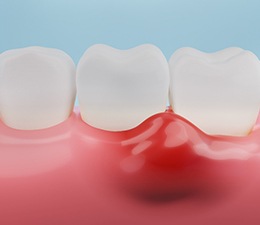
Due to its two stages, gum disease can have a wide range of symptoms. What signs you show will depend on which form of the condition you have.
Take gingivitis, for instance. Its most common symptoms include:
- Chronic bad breath
- Gum recession
- Bleeding gums
- Gum swelling
- Dark red gums
- Gum tenderness
Meanwhile, periodontitis has unique signs of its own. It can show symptoms beyond those of gingivitis. These are:
- Chewing pain
- Tooth sensitivity (often due to gum recession)
- Loose permanent teeth
- Changes in your restoration’s fit
- A shift in your bite
- Permanent tooth loss
How Do We Treat Gum Disease?

When you arrive for your visit, our dentists will perform an oral exam. Doing so lets us see the state of your gums – whether they’re sensitive, inflamed, etc. Once our team has finished their assessment, we’ll discuss potential treatment options with you. These would be either scaling and root planing or antibiotic therapy.
Scaling & Root Planing
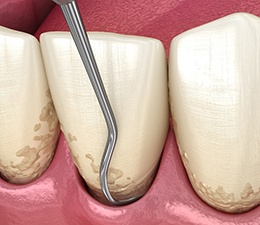
When done together, scaling and root planing are the standard way to treat gum disease. They consist of a multi-step deep cleaning around your gumline.
Standard scaling and root planing are done over two appointments. At the scaling visit, our dental team eliminates plaque and tartar with a sonic scaler. The second visit does “root planing,” which smoothes the root areas of each tooth. By doing so, your gums can better reattach to your teeth healthily.
Antibiotic Therapy
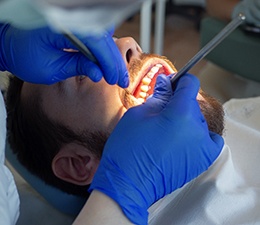
Some cases of gum disease are worse than others. If yours is severe, we may perform antibiotic therapy after your scaling and root planing.
For antibiotic therapy, our dentists apply a topical antibiotic to your infected gum pockets. This medicine targets the disease bacteria over a two-week period. Once that period is over, your gums should be in much better shape and show fewer symptoms. They’ll have gotten the crucial relief they needed.
Preventing Gum Disease

Advanced gum disease inflicts extensive damage on your mouth, and it can cause major health issues that lower your quality of life. Dr. Marini naturally has plenty of ways to treat the condition should it form. However, you’d be better off if you avoided gum disease entirely! Luckily, the right oral health habits can help you do just that.
Brush Your Teeth

When harmful bacteria are allowed to build up, they can enter and infect the gums, destroying the tissues that anchor your teeth in place. Your goal should be to keep the presence of oral bacteria to an absolute minimum, and that means brushing thoroughly at least twice a day. While brushing, pay attention to your tongue as well; bacteria tend to hide in this area, and they can easily be transferred to the teeth and gums whenever the tongue touches them.
Don’t Forget to Floss

Your toothbrush can’t reach every nook and cranny inside your mouth. Flossing is essential for removing food particles and plaque from between the teeth and along the gum line. Ignoring these spaces for a prolonged period of time can lead to trouble. If you have trouble using traditional dental floss, interdental brushes or water flossers might be easier to use.
Start Using Mouthwash
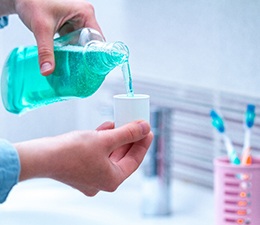
Have you made mouthwash a regular part of your oral hygiene routine? Doing so can help kill bacteria that you inadvertently overlooked while brushing and flossing. Check the ingredients of the mouthwash beforehand to make sure that it doesn’t contain any alcohol. You can rinse after each brushing and flossing session to round out the process.
Be Aware of the Risk Factors

It’s important to note that while gums disease can affect virtually anyone, there are a number of risk factors that can make it more likely. People who are older, use tobacco products, or have a family history of oral health issues are considered to be more at risk for gum disease. If any of these factors apply to you, it’s more important than ever to watch for the warning signs of gum disease (such as swollen or bleeding gums).
Maintain Your Regular Checkups
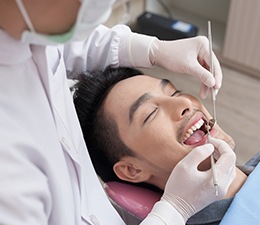
Gum disease is often referred to as a “silent killer” because the most noticeable symptoms often don’t occur until severe damage has already been done. That’s where your biannual dental checkups come in! In addition to looking for cavities, Dr. Marini will evaluate the health of your gums to see if there are any signs of an infection. If he finds a potential issue, he’ll let you know right away. Note that in many cases, if gum disease is found early enough, it can be completely reversed with a dental cleaning and good hygiene.
Gum Disease FAQs
Despite being preventable, the Centers for Disease Control and Prevention estimates at least half of adults have a form of gum disease. Although it’s common, few people know a lot about it. If your dentist has recently recommended you undergo periodontal therapy in Waterbury, you’re sure to have plenty of questions. Don’t worry, we’ll take the time to address them during your initial consultation. While you wait for your appointment, here are the answers to a few of the most common questions we hear.
What are the Risks of Untreated Gum Disease?
When left untreated, the infection will spread deeper into your oral structures. Over time, it will destroy the supporting structures for your teeth, causing them to loosen and fall out. In fact, gum disease is the leading cause of tooth loss.
Unfortunately, the complications of periodontal disease don’t stop at your mouth. The bacteria responsible for the infection can enter your bloodstream through the pressure of regular chewing. As it circulates throughout your body, it increases your risk of several serious health issues, including heart disease, respiratory infections, Alzheimer’s disease, and even diabetic complications.
Is the Damage Caused by the Infection Permanent?
The earliest stage of the infection is called gingivitis. At this point, the infection can be treated easily without causing any long-term complications. Unfortunately, many people don’t recognize the early signs of the infection. As a result, it progresses in severity until it destroys your oral structures.
Once the infection reaches advanced periodontitis, the damage is permanent. Although it can’t be reversed, there are several treatments to repair any issues it has caused. Even if you’ve experienced tooth loss, we can restore your smile back to a healthy, functional state using the latest advancements in dentistry, like dental implants.
Will the Infection Reoccur?
If you aren’t proactive about your oral hygiene, the infection can reoccur. We may recommend more frequent cleanings for a few months to ensure it doesn’t come back. These sessions would keep harmful bacteria from further harming your gum tissues.
Of course, there are ways to prevent gum disease yourself. These include:
- Use a soft-bristled toothbrush and tartar control toothpaste to brush your teeth for at least 2 minutes twice a day.
- Use a high-quality dental floss to clean in between each tooth and around the gum line every night.
- Visit your dentist at least twice a year for a cleaning and checkup.
- Don’t smoke or use tobacco.
- Don’t drink alcohol in excess.





